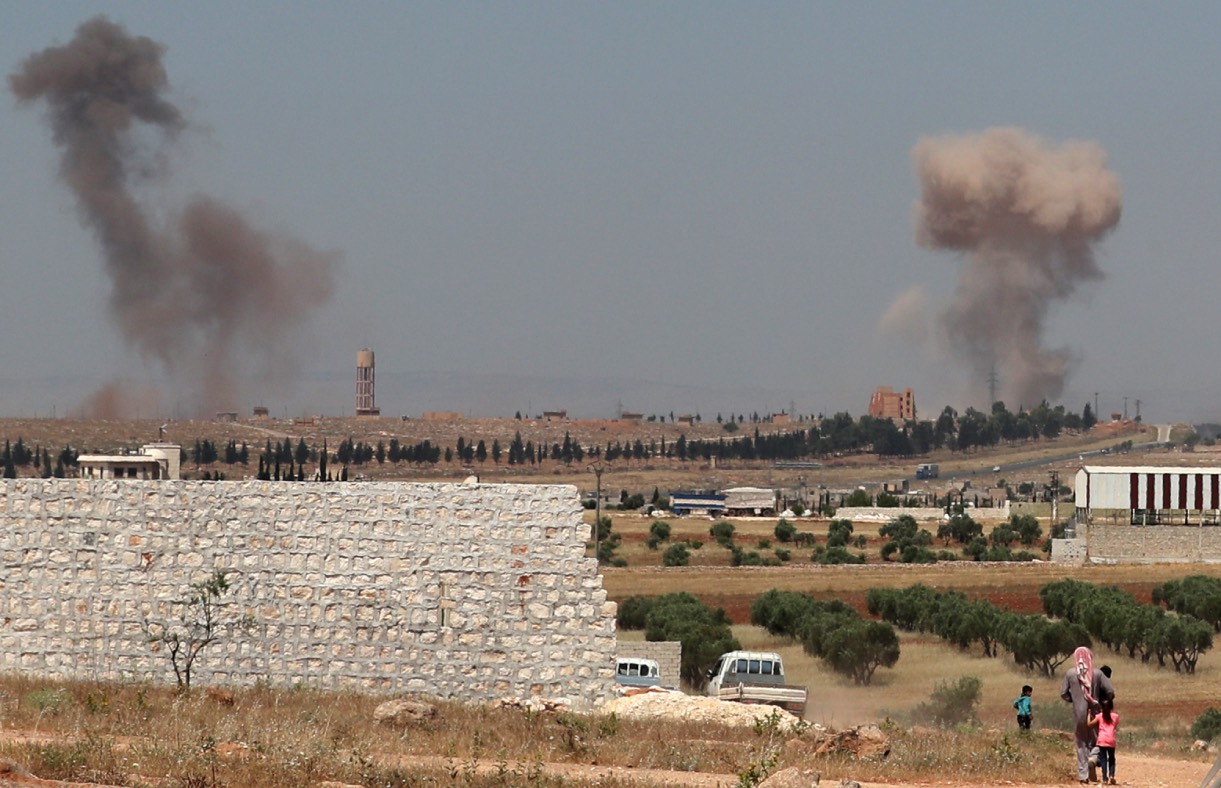Syrian forces ‘targeting hospitals and using cluster bombs’
Amnesty International accuses Assad of ‘crimes against humanity’ as bombing intensifies

A free daily email with the biggest news stories of the day – and the best features from TheWeek.com
You are now subscribed
Your newsletter sign-up was successful
Syrian regime forces have targeted hospitals and used banned cluster bombs, according to reports.
Bombing in the province of Idlib has intensified, killing scores of civilians. Pro-regime outlets have reported that troops have taken the key town of Kafra Naboudeh on the southeast of the Idlib pocket.
Although the Idlib pocket is supposed to be subject to a ceasefire agreed by Russia and Iran, the regime’s backers, as well as Turkey, the military has long maintained that the area would eventually have to be reconquered.
The Week
Escape your echo chamber. Get the facts behind the news, plus analysis from multiple perspectives.

Sign up for The Week's Free Newsletters
From our morning news briefing to a weekly Good News Newsletter, get the best of The Week delivered directly to your inbox.
From our morning news briefing to a weekly Good News Newsletter, get the best of The Week delivered directly to your inbox.
The World Health Organisation has confirmed 20 attacks on 18 different medical facilities in Idlib in the past three weeks alone. Al Jazeera says this leaves civilians “caught in the crossfire”.
United Nation officials have shared the GPS co-ordinates of 235 schools, hospitals and other civilian sites in Idlib province with Russia, Turkey and the US, in the hope this would protect them from being attacked.
“We share these coordinates so there is no doubt that a hospital is a hospital,” said Panos Moumtzis, a UN regional humanitarian co-ordinator.
In response to reports that hospitals are being targeted, Amnesty's Lynn Maalouf said: “This is part of a well-established pattern targeting medical facilities to systematically attack the civilian population and it constitutes crimes against humanity.”
A free daily email with the biggest news stories of the day – and the best features from TheWeek.com
Opposition groups have provided the media with silver fuses which it says are remnants of the mechanism for delivering cluster bombs, which are scores of bomblets deposited over a wide area. There are also reports of barrel bombs being dropped.
Sky News points out that “deliberately attacking medical facilities and civilian areas is deemed a war crime under international law” and that cluster bombs are “banned by most countries under international law and are viewed as a war crime by many countries”.
Meanwhile, France's foreign minister said yesterday there is evidence that chemicals had been used in attacks by Syrian government forces on rebels in northwest Syria, but they still needed to be verified.
The Syrian Observatory for Human Rights says that over the past five weeks shelling and airstrikes, including barrel bombs, has killed 305 civilians including 69 children.
-
 Tourangelle-style pork with prunes recipe
Tourangelle-style pork with prunes recipeThe Week Recommends This traditional, rustic dish is a French classic
-
 The Epstein files: glimpses of a deeply disturbing world
The Epstein files: glimpses of a deeply disturbing worldIn the Spotlight Trove of released documents paint a picture of depravity and privilege in which men hold the cards, and women are powerless or peripheral
-
 Jeff Bezos: cutting the legs off The Washington Post
Jeff Bezos: cutting the legs off The Washington PostIn the Spotlight A stalwart of American journalism is a shadow of itself after swingeing cuts by its billionaire owner
-
 Epstein files topple law CEO, roil UK government
Epstein files topple law CEO, roil UK governmentSpeed Read Peter Mandelson, Britain’s former ambassador to the US, is caught up in the scandal
-
 Iran and US prepare to meet after skirmishes
Iran and US prepare to meet after skirmishesSpeed Read The incident comes amid heightened tensions in the Middle East
-
 Israel retrieves final hostage’s body from Gaza
Israel retrieves final hostage’s body from GazaSpeed Read The 24-year-old police officer was killed during the initial Hamas attack
-
 China’s Xi targets top general in growing purge
China’s Xi targets top general in growing purgeSpeed Read Zhang Youxia is being investigated over ‘grave violations’ of the law
-
 Panama and Canada are negotiating over a crucial copper mine
Panama and Canada are negotiating over a crucial copper mineIn the Spotlight Panama is set to make a final decision on the mine this summer
-
 Why Greenland’s natural resources are nearly impossible to mine
Why Greenland’s natural resources are nearly impossible to mineThe Explainer The country’s natural landscape makes the task extremely difficult
-
 Iran cuts internet as protests escalate
Iran cuts internet as protests escalateSpeed Reada Government buildings across the country have been set on fire
-
 US nabs ‘shadow’ tanker claimed by Russia
US nabs ‘shadow’ tanker claimed by RussiaSpeed Read The ship was one of two vessels seized by the US military